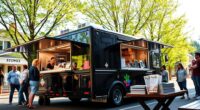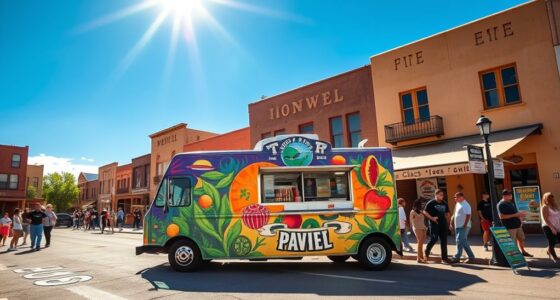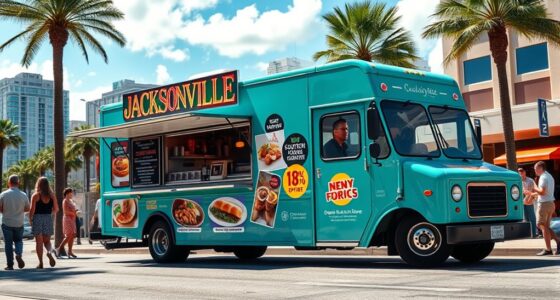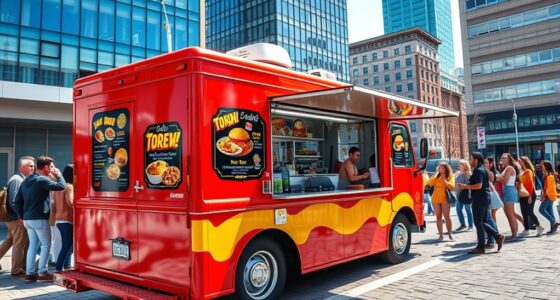To open a food truck in Montpelier, Vermont, you’ll need to secure permits like a Food Service Establishment License and possibly a Temporary Food Service Permit, which can take several weeks. Budget around $40,000 to $150,000 for your truck and equipment, plus monthly operating costs of $3,000 to $10,000. Find spots in zoning-compliant areas, develop a focused menu with local ingredients, and leverage social media and local events for marketing. If you keep exploring, you’ll find tips for smooth setup and success.
Key Takeaways
- Obtain necessary permits such as Food Service Establishment, vendor licenses, and zoning approvals before launching your truck.
- Budget $40,000–$150,000 for vehicle, equipment, permits, and initial inventory; plan monthly operating costs of $3,000–$10,000.
- Choose locations with proper zoning, parking, and access, avoiding restricted districts and ensuring off-street parking and setback compliance.
- Develop a small, focused menu with local ingredients, emphasizing food safety standards and appealing branding.
- Use social media, local events, and loyalty programs to market your food truck and build a loyal customer base.
Navigating Permit Requirements and Regulatory Compliance

Managing permit requirements and regulatory compliance is a crucial step when starting a food truck in Montpelier, Vermont. You’ll need a Food Service Establishment License, which costs $140 and covers all retail food operations, including trucks. If you plan to offer catering, a Commercial Caterer license is also necessary. For short-term events, a Temporary Food Service License applies. You must also secure approvals for wastewater, potable water, fire safety, and possibly taxes or asbestos if renovations are involved. Locally, you’ll need a vendor license to sell within Montpelier limits and permits for signage, zoning, and road access. Obtaining all necessary permits can take several weeks, so it’s advisable to start the application process early. Compliance with both state and municipal regulations is essential, ensuring your truck meets health standards and land use rules before you start serving customers. Additionally, understanding the permitting process and timelines can help you plan your launch more effectively.
Estimating Startup and Operating Expenses

Estimating your startup and operating expenses is a vital step in launching a food truck in Montpelier, Vermont. Your initial vehicle costs can range from $40,000 to $150,000 for a used or new truck, with custom builds reaching up to $200,000. You might consider leasing at $2,000 to $3,000 monthly to test the market before buying. Kitchen equipment costs $20,000 to $40,000, while a POS system runs $1,000 to $3,000. Initial inventory expenses are around $2,000 to $3,000 for food supplies. Licensing, permits, and compliance can total from $1,800 to $28,000, including health permits and inspections. Understanding local regulations and permit costs is essential for accurate budgeting. It’s also helpful to research cost-effective procurement options for ingredients to manage expenses efficiently. Monthly operating costs, such as fuel, wages, and maintenance, typically range from $3,000 to $10,000. Budget accordingly to guarantee a smooth launch.
Finding Suitable Locations and Understanding Zoning Rules

Finding a suitable location for your food truck in Montpelier involves understanding the city’s zoning rules and restrictions. Montpelier’s zoning districts regulate where commercial activities, including food trucks, are permitted. Many mobile food services require conditional use approval, especially in commercial or mixed-use areas, and may need Development Review Board approval. Food trucks must meet district-specific setback and lot size requirements, and access must be from appropriate streets—less-traveled roads are preferred unless otherwise approved. You’ll need a zoning permit, and possibly a conditional use permit or site plan approval, depending on the location. Parking requirements include off-street spaces, usually 9 by 18 feet, located to the side or rear of buildings. Restrictions prevent operating in districts where food trucks are prohibited or storing unlicensed vehicles in residential zones. Additionally, understanding zoning regulations can help you identify suitable areas that comply with local laws and enhance your operation’s success.
Planning Your Menu and Ensuring Food Safety Standards

Planning your menu carefully is essential for a successful food truck operation, especially since space is limited and customer wait times are expectations. Focus on dishes that are quick to prepare and serve, using locally sourced Vermont ingredients to appeal to regional tastes and guarantee freshness. Keep your menu small, typically 5-10 items, to simplify inventory and reduce waste. Design it around a clear theme or specialty, like BBQ or vegan options, to strengthen your brand identity. Make sure to include choices for dietary restrictions such as vegetarian or gluten-free to attract a broader audience. Additionally, selecting diverse and appealing designs for your food truck can enhance customer interest and brand recognition. Equally important, comply with Vermont food safety standards by obtaining necessary permits, maintaining proper sanitation, and using appropriate equipment like sinks and temperature controls to keep food safe. All food-serving places must have an annual license from the Department of Health, and ensuring your menu and operations meet these standards helps prevent violations during inspections.
Effective Marketing Strategies to Grow Your Food Truck Business

To successfully grow your food truck business in Montpelier, Vermont, you need a strategic marketing approach that maximizes your reach and builds customer loyalty. Using social media is essential—68% of owners promote regularly, with Facebook being the most popular. Engaging online can boost customer spending by an average of 15%, and 52% report a 20% sales increase through targeted campaigns. Leverage local festivals and events to increase visibility and foot traffic, securing prime spots and building community recognition. Implement loyalty programs and email marketing to encourage repeat visits and referrals. Additionally, data analytics and GPS tracking improve customer engagement and spontaneous visits. Market growth and industry trends indicate that a well-executed marketing strategy can significantly enhance your business’s success.
Understanding local demographics and preferences can help tailor your marketing efforts more effectively. Here’s a quick overview:
| Strategy | Key Benefit | Tips |
|---|---|---|
| Social Media | Increased visibility | Post consistently, use targeted ads |
| Local Events | Community engagement | Partner with organizers |
| Loyalty Programs | Repeat business | Offer rewards, personalized offers |
| Data Analytics | Better marketing | Track customer preferences |
| Content Marketing | Brand differentiation | Share your story and visuals |
Frequently Asked Questions
How Long Does the Permit Approval Process Typically Take in Montpelier?
You’re probably wondering how long the permit approval process takes in Montpelier. Typically, state food-related licenses like health permits take around 30 days. Local vendor’s licenses depend on City Council meetings and can vary. Online applications usually process within five business days, but zoning and other special permits may take longer due to multiple review stages. Staying thorough and submitting complete applications helps speed things up considerably.
Are There Any Restrictions on Operating Hours for Food Trucks?
You might feel enthusiastic to serve your delicious food whenever customers crave it, but local rules gently guide your hours. While Montpelier doesn’t specify strict restrictions, nearby towns often prefer daytime service to keep things friendly and safe. Expect to operate within typical lunch and dinner hours, usually around 11 a.m. to 8 p.m., and stay mindful of seasonal or event-based limits that could influence your schedule.
Can I Sell Alcohol Alongside My Food Offerings Legally?
You can sell alcohol alongside your food offerings legally, but you must obtain a separate liquor license from Vermont’s Department of Liquor & Lottery. This license allows you to serve alcohol within your truck’s licensed area, following specific rules like operating hours and age restrictions. Be prepared for compliance checks, and confirm your staff is trained in responsible alcohol service to avoid penalties or license suspension.
What Insurance Coverage Is Recommended for Food Truck Businesses?
Think of insurance as the safety net beneath your food truck’s high-flying act. You’ll need general liability to protect against customer injuries, product liability for food-related claims, and commercial auto insurance since your truck’s always on the move. Don’t forget equipment coverage for repairs, workers’ comp if you hire staff, and physical damage to guard against weather or theft. These coverages keep your business steady, no matter what bumps along the road.
Are There Tax Incentives or Grants Available for New Food Trucks?
You want to know if tax incentives or grants are available for new food trucks. Vermont offers programs like the Vermont Employment Growth Incentive (VEGI), which could benefit your business if you create jobs and invest locally. Additionally, regional grants and workforce training funds may help reduce costs. Keep an eye on state and local websites for rolling application windows, and consider reaching out to Montpelier’s offices for specific local programs.
Conclusion
With wise planning and a passion for food, you’ll successfully start your Montpelier food truck. Master the permits, manage the costs, and map out your menu with precision. Find fantastic locations, adhere to all regulations, and craft compelling marketing strategies. Remember, diligent dedication and dynamic decisions drive your delicious dream forward. So, seize the space, serve with sincerity, and soar in Montpelier’s bustling food scene—your flavorful future is just a truck away!









